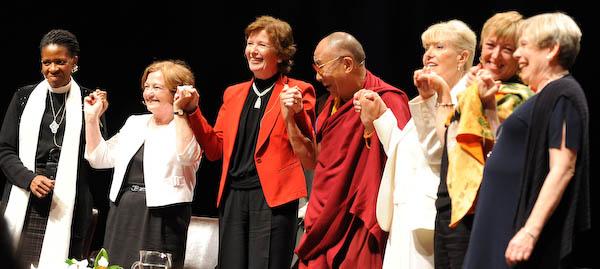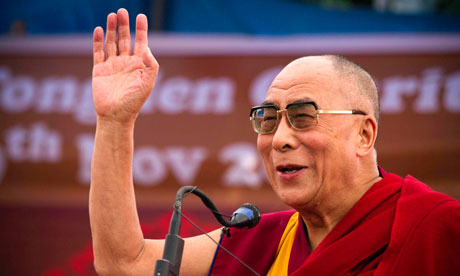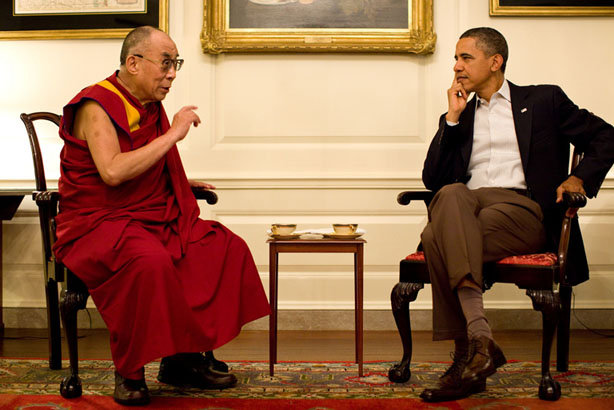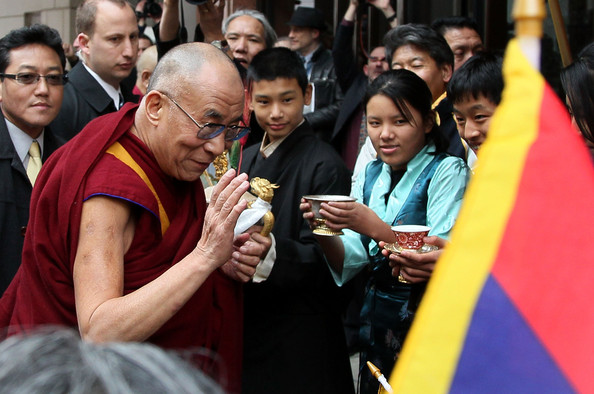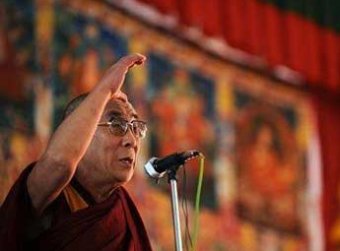Dalai Lama’s Social Stance On…
Democracy: In the opinion of the Dalai Lama, democracy allows for the greatest freedom and unity of the people. In fact, he has outlined a plan for a future democratic governing power in Tibet, should native Tibetans return to their homeland. This type of government, he believes, coincides with his teachings.
The Dalai Lama on 18 February 2010 outside the White House in Washington DC
Women: The Dalai Lama advocates for equality among women and men, interpreting the Buddha’s message of both sexes having equal potential of achieving Nirvana. The Lama has helped introduce serious studies of the Buddhist philosophy among nunneries in Southeast Asia.
The Dalai Lama on stage with Rev Mpho Tutu, Mairead Maguire, Mary Robinson, Betty Williams, Jody Williams, and Karen Armstrong on International Women's Day, March 8, 2010
Science: The Dalai Lama believes that both Buddhism and science "share significant commonalities, especially in their basic philosophical outlook and methodology", such as the disapproval of absolutes, evolution, and other natural laws. He believes that if the two traditions cooperate, human understanding will be able to go further than it has ever gone.
The Dalai Lama at a conference speech in New Delhi
What He Did…
The 14th Dalai Lama is probably the most well known as an advocate for Tibetan rights. The Dalai Lama also is recognized as an influential public speaker. Thus, one of the most important things he did to further the rights of Tibetans was appealing to the United Nations, which resulted in the creation of the Tibetan interpretation of the “Universal Declaration of Human Rights” in 1965. This was a formal document that explicitly stated all of the rights that Tibetans had – previously nonexistent, due to the Chinese’s harsh rule.
The Dalai Lama also opened up the Library of Tibetan Works and Archives in Dharamsala, India. This library is considered as one of the most important archives of Tibetan literature in the entire world, containing more than 80,000 pieces of literature that were relocated from Tibet in 1959.
President Barack Obama in a meeting with the Dalai Lama at the White House
In 1987, the Dalai Lama visited Washington, D.C. and attended the Congressional Human Rights Caucus. He gave a speech there, talking about how he wanted Tibet to become a peaceful, war-free zone, which would mainly happen by barring the Chinese from entering. This plan was later called the “Strasbourg Proposal”, as he expanded on this in Strasbourg, France in 1988.
The 14th Dalai Lama also strengthened interfaith relationships by meeting with Pope Paul VI of the Catholic Church in 1973, Pope John Paul II many times between 1980 and 2003, and Pope Benedict XVI in 2006. Over the years, he has also met with numerous Jewish, Anglican, Mormon, Hindu, Islamic and other religious leaders.
Gender equality is an issue that is still prevalent today, and the Dalai Lama does as much as he can to support it. While on a visit to the United States in 2009, the Dalai Lama traveled to the National Civil Rights Museum in Memphis, Tennessee. He said, “I call myself a feminist. Isn’t that what you call someone who fights for women’s rights?” This succinct proclamation speaks for itself.
The Dalai Lama greeted by well-wishers after arriving at the Park Hyatt hotel in Washington
The Dalai Lama continues to give teachings to Buddhists as well as talking to politicians regarding the situation in Tibet. Worldwide, he advocates for peace, tolerance, and a good understanding between science and religion – over the years his work has earned him many awards. He also continues to write books, adding to his already impressive bibliography.
The Spark TODAY
Through his unceasing efforts, the Dalai Lama has shown us a man who has worked to secure his people and his country his entire life while promoting peace, unity, and goodness. He won the Nobel Peace Prize in 1989, as well as countless other awards for his worldwide efforts. Despite all the pressure he has received from the Tibetan oppression, he is still a cheerful man who laughs even at the slightest joke and tries to make the visitors to his home in India as welcome as possible. The Dalai Lama still currently travels internationally with his message of harmony and morals to achieve happiness for all, while pursuing a solution for the issue back in his home country.

